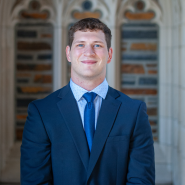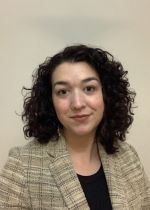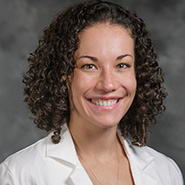
Jennifer Hammel, PhD
Postdoctoral Research Associate
Dept of Biomedical Engineering
KURe Project: An Engineered Model of the Bladder Wall to Identify Countermeasures against Microvascular Damage in Radiation Cystitis
Mentors: Sharon Gerecht, PhD; Andrew Peterson, MD
Dr. Hammel completed her undergraduate education in Bioengineering at Temple University, where she developed a 3D engineered model of vascularized adipose tissue. Remaining inspired to continue research, she then pursued her PhD in Biomedical Engineering at Virginia Tech. During her time there, she developed engineered models of the lymph node and meningeal lymphatics to study cell and fluid transport, response to chemotherapy, and metastasis. With this work, she saw the damage that cancer treatment can cause to healthy tissues in the body. Dr. Hammel now works with Sharon Gerecht at Duke University, whose lab focuses on understanding microenvironmental cues in vasculature across broad contexts.
As a KURe scholar, Dr. Hammel will develop a tissue engineered model of the bladder wall. She will use this model to study radiation cystitis with clinical mentorship from Dr. Andrew Peterson. This research aims to identify novel mechanisms behind radiotherapy-induced bladder dysfunction and to develop a useful in vitro platform for testing countermeasures and treatments. Dr. Hammel is passionate about creating sophisticated in vitro models to understand the long-lasting impacts of cancer treatment and using these platforms to develop therapeutics that improve quality of life for cancer survivors.

Grant West, PhD
Postdoctoral Associate
Mechanical Engineering and Material Science
KURe Project: Kidney Stone Fatigue Characterization for Optimal Laser Lithotripsy Settings
Mentors: John Dolbow, PhD; Pei Zhong, PhD
Dr. West completed his undergraduate education at Lehigh University in Civil and Environmental Engineering and earned his PhD at Cornell University. During his graduate studies, Dr. West developed expertise in mechanical testing conceptualization, analysis, and simulation for fatigue and fracture prediction. Computationally, he contributed to algorithm development for efficiently calculating fracture properties in brittle solids from displacement data. His dissertation emphasized his experimental contributions, particularly a novel high-throughput, high-cycle fatigue testing methodology to characterize aerospace alloy behavior.
As a KURe scholar working in the Dolbow computational mechanics laboratory, Dr. West is applying his prior experience to characterize kidney stone ablation and fracture during laser lithotripsy. Through mechanical testing and modern computational techniques, his goal is to build a predictive framework for the timing and location of kidney stone fracture initiation and propagation during procedures, leading to safer and more effective outcomes. His broader research interests include creating innovative experimental strategies for fatigue characterization of biomaterials and developing computational models for the multi-physics problems inherent to complex environments. Ultimately, his work aims to advance predictive mechanics across both biomedical and structural systems.

Natasha L. Wilkins PhD
Postdoctoral Research Associate
Department of Biomedical Engineering
KURe Project: Sacral Nerve Stimulation for Restoration of Bladder Function in Spinal Cord Injury
Mentors: Warren Grill, PhD; Eric Jelovsek, MD MMEd MSDS
Dr. Wilkins is a preclinical scientist with over ten years of experience in rodent models of spinal cord injury. After substantial work as a research technician at the Medical College of Wisconsin under the supervision of Dr. Brian Stemper and Dr. Matthew Budde, she attended graduate school at the University of Louisville. During her time there, under the tutelage of Dr. Charles Hubscher, Dr. Wilkins developed expertise in spinal cord epidural stimulation as an intervention for neurogenic bladder and sexual dysfunction following spinal cord injury.
She works in the Grill laboratory, where she conducts preclinical experiments to determine the efficacy of sacral nerve stimulation as a treatment for bowel dysfunction induced by spinal cord injury. As a KURe scholar, Dr. Wilkins will expand her work on sacral nerve stimulation to address neurogenic bladder dysfunction resulting from spinal cord injuries. This research aims to develop a framework for the application of sacral nerve stimulation as a therapeutic option for those suffering from this condition. In addition to her work in neuromodulation, Dr. Wilkins is passionate about improving the quality of life for individuals with neurogenic bladder dysfunction. She is also dedicated to destigmatizing female urinary and sexual dysfunction to foster greater conversation within the scientific community and enhance transparency between patients and clinicians.

Cassandra Kisby, MD
Assistant Professor
Dept. of Ob/Gyn
KURe Project: Exosome-Induced Genitourinary Regeneration
Mentors: Shyni Varghese, PhD; Cindy Amundsen, MD
Dr. Kisby completed her undergraduate education at Duke University, majoring in Biological Anthropology and Anatomy, Chemistry and Spanish. She continued her training at Duke University Medical Center for both medical school and residency. During her Obstetrics and Gynecology residency, she was recognized for both her surgical excellence and dedication to teaching. Dr. Kisby went on to complete a fellowship in Female Pelvic Medicine and Reconstructive Surgery at Mayo Clinic Rochester. She discovered an interest in translational research early in her career, conducting her first randomized controlled trial in residency. She has continued to establish a fruitful research career, earning a Master's in Biomedical Research and Certificate in Clinical and Translational Research. During fellowship, she developed a skillset in regenerative medicine and her research focused on women's health applications of a cell-free exosome platform.
As a KURe scholar, Dr. Kisby will continue her work in women's health regenerative medicine, with the goal of translating regenerative medicine technologies to the bedside to fulfill unmet patient needs. Dr. Kisby's clinical interests include congenital anomalies, mesh complications following pelvic reconstructive surgery, postpartum pelvic floor disorders, pelvic organ prolapse, and urinary incontinence. She is also involved in efforts to create a diverse and inclusive work and patient care environment, as well as equity for women in medicine/science.